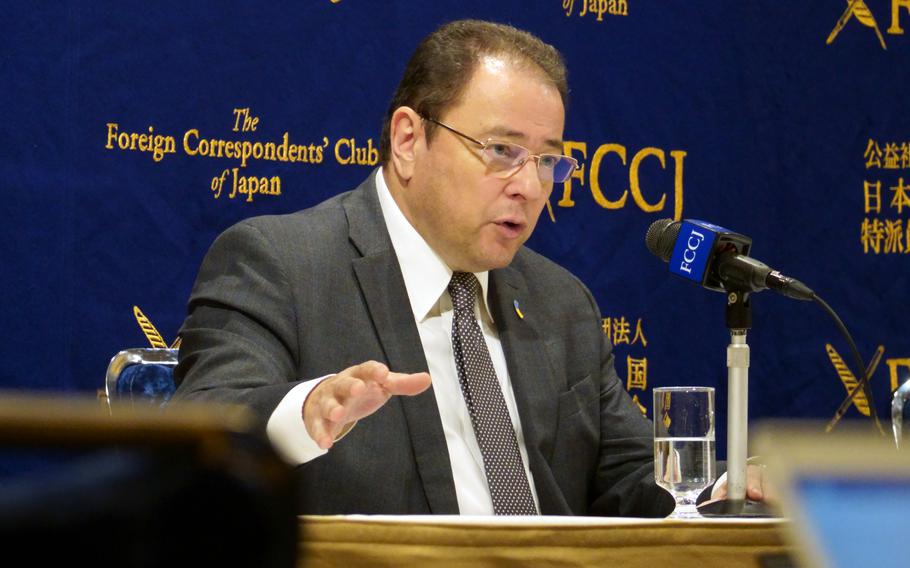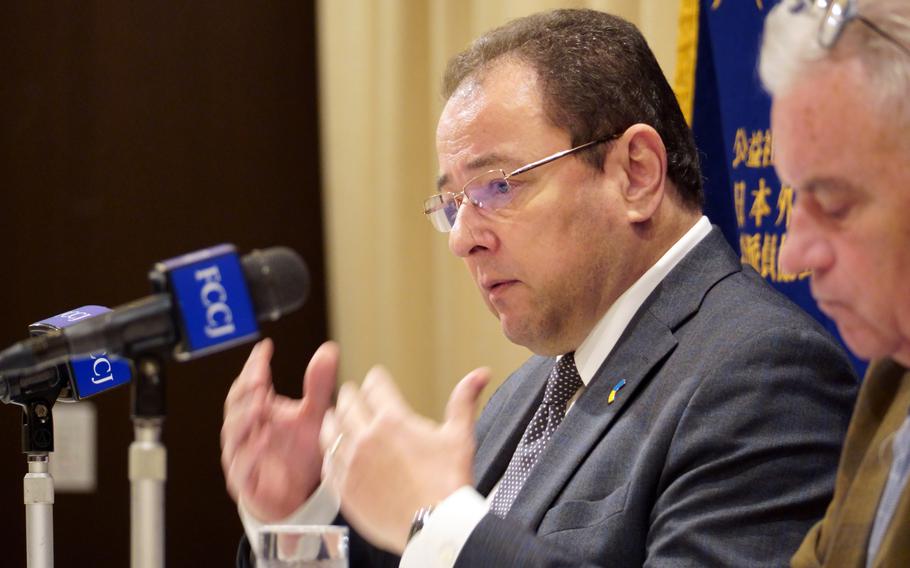
Ukrainian Ambassador to Japan Sergiy Korsunsky speaks to reporters at the Foreign Correspondents' Club of Japan in Tokyo on Nov. 19, 2024. (Akifumi Ishikawa/Stars and Stripes)
TOKYO — North Korean troops in Russia are learning battlefield lessons that will pose a challenge for the United States and its Asian allies, according to Ukraine’s top diplomat in Japan.
Ambassador Sergiy Korsunsky, speaking Tuesday at the Foreign Correspondents’ Club of Japan, blamed Moscow for the ongoing conflict. His talk marked the 1,000th day of hostilities in his homeland.
The recent arrival of nearly 10,000 North Korean troops in Russia’s Kursk region bordering Ukraine is a concern, he said, adding: “We already begin eliminating them from battlefield.”
Korsunsky spoke the day before Ukraine for the first time used a long-range, U.S.-made tactical missile to strike targets deeper inside Russia, a potentially significant escalation of the war. President Joe Biden on Monday lifted restrictions on Ukraine’s use of the Army Tactical Missile System to strike Russia.
Ukraine has received massive quantities of weapons and funding from the U.S., but President-elect Donald Trump has promised to quickly resolve the conflict once he takes office in January.
What Russia will supply to North Korea in exchange for the ground troops is a serious problem, Korsunsky said.
“It’s about military technologies … which enable North Korea to move forward with their missile program,” he said.

Ukrainian Ambassador to Japan Sergiy Korsunsky speaks to reporters at the Foreign Correspondents' Club of Japan in Tokyo on Nov. 19, 2024. (Akifumi Ishikawa/Stars and Stripes)
The Oct. 31 launch by North Korea of an intercontinental ballistic missile that flew thousands of miles was directly related to cooperation with Russia that will continue, Korsunsky said.
“North Korea will become much more sophisticated in terms of militarchy technologies” he said.
North Korean officers and advisers are in Russia to study modern war, not to fight, Korsunsky said.
“We believe this is … one of the ideas of (North Korean leader) Kim Jong Un to participate in this war,” he said.
North Korea, backed by China for decades, recently signed a defense pact with Russia.
“They (the North) have two security guarantees from two military powers,” Korsunsky said, adding that the support “will embolden Kim Jong Un to make any provocations when conditions will be ripe.”
The ambassador’s words echoed comments Monday by U.S. State Department spokesman Matthew Miller at a press briefing in Washington.
“Our concerns are not just because of the fact that North Korea has introduced its own forces onto the battlefield with Ukrainian soldiers, but what it is that North Korea might be getting in return,” he said.
It’s unclear what Russia might provide the North, Miller said.
A modern-day version of the Soviet Union’s old Warsaw Pact alliance could reemerge linking Russia, North Korea and Iran, Korsunsky said.
Kim, who visited a drone test site last week, has ordered mass production of attack drones, according to the country’s state media.
“They saw that this war is a war of drones,” Korsunsky said. “Imagine that instead of balloons with bad things they send to South Korea, if they have drones flying to South Korea. That is a direct result.”
Ukrainians don’t want territorial concessions to Russia to end the war and expect Russian President Vladimir Putin to keep fighting, not for land or resources but for power, according to the ambassador.
“We have to fight back,” he said. “We have no choice. We don’t need advice. … We don’t need phone calls to Putin. We need weapons.”